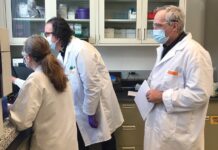
Eighth-grade science teacher Jane Ramos has used the Jason Learning educational program for the past eight years. For her, it’s been a tool to engage students who wouldn’t otherwise be interested in science.
“One of the most wonderful things is that it’s role-model based. There are featured scientists in each unit and the kids learn scientists are regular people doing great work; they don’t look like crazy scientists in lab coats,” she said.
But due to state budget cuts this year, Rhode Island is now the only state in the union to no longer fund Jason Learning.
Founded in 1989 by renowned explorer Robert Ballard, Jason Learning is an educational program featuring teacher training, a curriculum, online tools and diverse field programs that inspire students to follow in the footsteps of STEM – or science, technology, engineering and math – role models. Since 2012, with the help of state funding, the Jason Learning online curriculum has been adopted by more than 20 Rhode Island school districts impacting more than 700 teachers and administrators in the past three years alone.
Ramos, who attended the 2016 Jason Learning National Conference in June, is concerned about how she and other teachers will incorporate the intuitive, hands-on Jason Learning curriculum without the program’s teacher professional-development training, which was included in the package eliminated by the General Assembly.
“For other communities that haven’t received that training they might never know about [the benefits of] Jason Learning. Honestly, there are certain things available to every teacher that each district can provide, and you do with what you have,” she said.
Jason Learning stands out among educational tools, Ramos explained, because of the creative ways in which it helps teachers meet Rhode Island’s state-regulated Next Generation Science Standards, first applied in 2013.
“For a first-time teacher it’s a very big task to figure out how to teach within the Next Generation Science Standards; if you’re using a curriculum like Jason Learning, you’ll find a lot of the standards get hit [very easily],” she said.
“This year my students, without online access, will have a different experience. It won’t be as good as students from previous years,” she said.
This year state lawmakers declined to provide $250,000 sought by Jason Learning.
Larry Berman, spokesman for House Speaker Nicholas A. Mattiello, called Jason Learning a good program that “did not meet the standards that provided a unique service to the state. … There were a lot of tough decisions.”
Bill Fischer, a Jason Learning spokesperson, said there may be hope for the program’s return.
“We’re looking for ways to find private donations to ‘Band-Aid’ a limited program together for the upcoming year, in the hopes of bringing the topic back in next year’s legislative session,” he said.
State funding was also withheld in 2015 following arbitration eventually decided in Jason Learning’s favor. Eleanor Smalley, Jason Learning president and CEO, explained during that time the company chose to directly fund programming in Rhode Island.
“We decided it was the right thing to do … [and] we provided over $220,000 worth of scientific educational programming. …We cannot continue to offer our services in Rhode Island for free,” she said in a release.
For the past three years, Karen Tarasevich has served as West Warwick’s superintendent and has overseen the integration of Jason Learning in her school district. Tarasevich is instructing those teachers who, like Ramos, have benefited from multiple years of Jason Learning to “sustain and maintain” what they can from the program.
“Learning is growth and growth is exposure to new opportunities and curricula. I am confident the teachers will be able to maintain what they’ve learned, but that level of continuous access is what we won’t have access to,” she said.
The Jason Learning curriculum provided a multitiered professional-development opportunity for teachers of all skill levels in the West Warwick school district, explained Tarasevich.
“Trained teachers brought back [curriculum developments and innovations] to the newer, untrained teachers. From that one opportunity we’re able to benefit in multiple ways,” she said.
“West Warwick is considered a distressed community, finances are very limited and the budget in our school is pretty tight. …We just don’t have those types of resources,” she added. •











